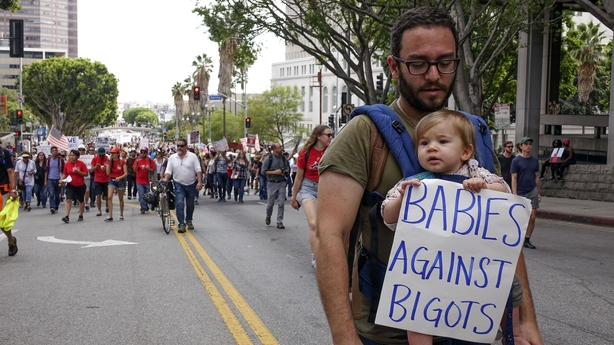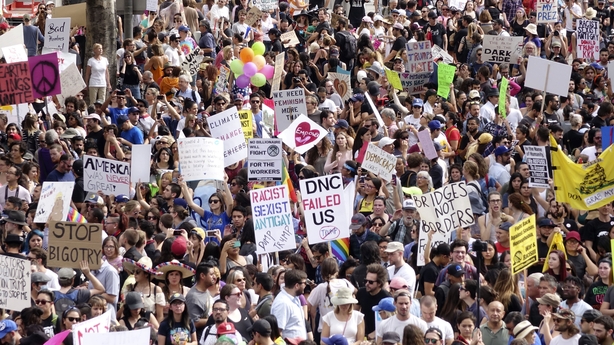Hillary Clinton has blamed FBI director James Comey for her stunning defeat in Tuesday's presidential election in a conference call with her top campaign funders today, according to two participants on the call.
Mrs Clinton was projected by nearly every national public opinion poll as the heavy favourite going into Tuesday's race.
Instead, Republican Donald Trump won the election, shocking many throughout the nation and prompting widespread protests.
Mrs Clinton has kept a low profile since her defeat after delivering her concession speech on Wednesday morning.
On the phone call with supporters today, Mrs Clinton said her campaign and the national party had raised $900m from more than three million individual donors, according to the two participants.
Mrs Clinton said Mr Comey was at fault for her loss after he decided to send a letter to Congress only days before the election announcing that he was reinstating an investigation into whether she mishandled classified information when she used a private email server while secretary of state from 2009 to 2012.
Mr Comey announced a week later that he had reviewed emails and continued to believe she should not be prosecuted, but the political damage was reportedly already done.
Mrs Clinton told donors that Mr Trump was able to seize on both of Mr Comey's announcements and use them to attack her, according to the two participants on the call.
While the second letter cleared her of wrongdoing, Mrs Clinton said that reinforced to Mr Trump's supporters that the system was rigged in her favour and motivated them to mobilise on election day.
A spokesperson for Mrs Clinton could not immediately be reached for comment.

Meanwhile, demonstrators marched again today in cities across the United States to protest against President-elect Donald Trump, who they say will threaten their civil and human rights, a day after a protester was shot in Portland, Oregon.
Rallies were scheduled throughout the day in New York, Los Angeles and Chicago, where organisers said they hoped to continue the momentum after several nights of demonstrations triggered by the real-estate mogul's surprise win in Tuesday's presidential election.
Chanting slogans including "Not My President", several thousand protesters marched peacefully up New York City's Fifth Avenue before filling the streets around Trump Tower, the president-elect's skyscraper home.
"We're horrified the country has elected an incredibly unqualified, misogynist, racist on a platform that was just totally hateful," said Mary Florin-McBride, 62, a retired banker from New York who held a sign reading, "No Fascism in America".
There were also demonstrations in Chicago and Los Angeles, where several thousand protesters gathered beneath MacArthur Park's palm trees before marching toward downtown.
Hours before the demonstrations were set to begin, a protester in Portland was shot as he took part in a march across the Morrison Bridge. He is expected to live, but the suspect remains at large, police said.
Since Mr Trump's victory, demonstrators in several cities have decried the Republican's campaign promises to restrict immigration and register Muslims, as well as allegations that the former reality-TV star sexually abused women.
As of early this morning, some 100,000 people had indicated on Facebook that they were planning to attend or were interested in the anti-Trump rallies in New York, Chicago and Los Angeles, where organisers told protesters that violence and vandalism will not be tolerated.
The demonstrations so far have been largely peaceful, although in Portland protesters smashed store windows, sprayed graffiti and damaged cars as they clashed with police who used tear gas and rubber bullets to disperse crowds.
Dozens of protesters have been arrested and a handful of police injured during the protests in Portland and other cities.
Security barricades now shield some of Mr Trump's most visible properties, including the newly opened Trump International Hotel near the White House and Trump Tower in New York.
Republican National Committee Chairman Reince Priebus said yesterday that protesters have to accept the election results.
We need your consent to load this rte-player contentWe use rte-player to manage extra content that can set cookies on your device and collect data about your activity. Please review their details and accept them to load the content.Manage Preferences
Nigel Farage is first British politician to meet with Trump
Nigel Farage has become the first British politician to meet Mr Trump since he became US President-elect.
The pair met at Trump Tower in New York and discussed "freedom and winning", according to UKIP sources.
The encounter will be seen as a major political coup for the interim leader of UKIP.
The meeting came after Mr Farage used the American media to warn British Prime Minister Theresa May that she needed to "mend fences" with Mr Trump.
Asked on Fox News why Mr Trump should meet the PM after the things senior Tories had said about him, Mr Farage said: "I think he has got to meet her.
"Mrs May's team have been quite rude about Trump, so there are some fences to be mended," said Mr Farage.

